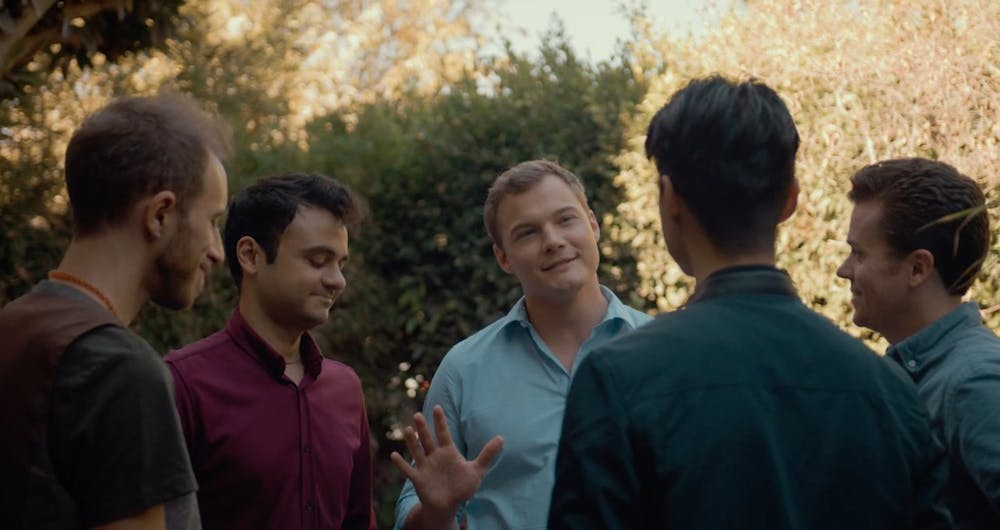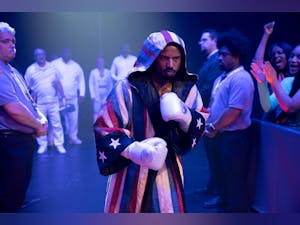From: Silver Screen
REVIEW: ‘Dinner Party’ seeks to address poignant topics including loyalty, trust and friendship

Editor’s Note: This review contains mention of sexual assault.
If there's one thing that all great films share, it's the ability to change the way people view the world and their roles within it. To pull this off, filmmakers have to take risks. In “Dinner Party,” director Chris Naoki Lee takes the safe route at every potentially polarizing moment.
The movie begins as Cal (Lee) and his girlfriend Izzy (Imani Hakim) drive to his friends Vinny (Daniel Weaver) and Shannon’s (Kara Wang) house for a reunion dinner party with his old high school entourage. Conversation at the dinner table starts out cordial but quickly escalates into a heated debate over topics such as bodily autonomy, misogyny, racism and mansplaining. The conflict culminates when it’s revealed that Miles (Charles Hittinger), the most vocally aggressive member of the group, sexually assaulted Shannon at a party 10 years earlier.
The group’s members are stunned at this revelation. The rest of the film unfolds as the partygoers decide how to address the news as well as their relationships with one another.
While “Dinner Party” addresses difficult topics of discussion, it ultimately fails to say anything new. Where more depth is needed, characters regularly present very simplistic takes on the nuanced subject matter. At best the film is a good reminder about the emotional toll that sexual assault exacts on a person's life. But that's not new information.
The most troubling aspect of “Dinner Party” is the black and white moral messaging. Watching the film, it feels like everything Miles does and stands for is written to disgust us. He repeatedly bullies other characters, often with racial remarks, and even berates Cal and Rish (Mayank Bhatter) by calling them “curry rice” in reference to their shared AAPI identity.
By creating a character that’s so comfortable with his own prejudices, Lee makes an easy target for the other group members to correct and disdain. Every single person sitting at the dinner table rightfully confronts Miles, and by proxy, we get to feel as though we’re correcting him too. And he should be corrected. But by making Miles so condemnable, Lee misses the chance to address the more innocuous, insidious aspects of privilege among other characters that are all too common. Many of Miles’s lines feel like they’re straight out of the 1950s. Instead of contributing a meaningful addition to the conversation about prejudice, Lee inadvertently provides audience members with the opportunity to feel false virtue as they compare themselves to Miles.
Despite its shortcomings, “Dinner Party” does contain a number of well-executed performances. Wang, who plays Shannon, puts on an emotionally powerful showing. We feel her pain as she struggles with the self-doubt, confusion and anger that has built up as a result of her trauma.
The pacing of the film is also an achievement. We can feel the environment of the party slowly grow more and more uncomfortable as it leads up to the explosive dinner scene. Casual chit-chat between characters evolves into uncomfortable conversation as old grudges and new revelations are divulged to the audience. Ultimately, the climactic conflict at the dinner table fails to generate much insightful dialogue, but the journey there is chock-full of tension.
Lee’s film strives to contribute to the conversations surrounding a variety of important issues, but when given the opportunity, it falls far short of its goals. In reality, instead of actually engaging with more internalized bigotry, viewers may watch this film and think to themselves, “well, at least I’m not as bad as Miles.” The film’s merits are ultimately outshined by its unwillingness to say anything difficult. Anyone unable to take a seat at this table won’t be missing any new information.
“Dinner Party” screened at the DC Asian Pacific American Film Festival from July 15 to July 25.




